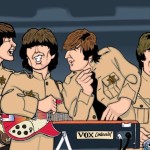March 20, 2014 | Posted in CULTURE & HISTORY, FAN FICTION | By from the archives
What is fan fiction history?
By Laura Hale
This essay was originally published June 2005 at FanHistory.com.
One of the things of interest to a number of fan fiction scholars is the history of fan fiction. On the outside, it appears that if you can understand it, you should be able to understand what defines fan fiction, what the cultural practices are, why fan fiction communities exist as they do today, and a number of other things of interest to fanthropologists, people doing textual analysis of fannish works, lawyers trying to understand the legal implications of fannish activities, and those seeking to understand the broader educational implications of fan fiction. The problem faced by many of these groups is how do you document the history of fan fiction? What pieces of fan fiction have historical value and provide insight into this community, its works and its practices? Before these issues can be addressed there is a larger and more looming question: what is fan fiction history? This brief “paper” will define fan fiction history and touch on how to determine an events historical value in the context of the fan fiction community.
What is history?
Web WordNet 2.0: defines history as the following:
1. history — (the aggregate of past events; “a critical time in the school’s history”)
2. history — (the continuum of events occurring in succession leading from the past to the present and even into the future; “all of human history”)
3. history, account, chronicle, story — (a record or narrative description of past events; “a history of France”; “he gave an inaccurate account of the plot to kill the president”; “the story of exposure to lead”)
4. history — (the discipline that records and interprets past events involving human beings; “he teaches Medieval history”; “history takes the long view”)
5. ‘history — (all that is remembered of the past as preserved in writing; a body of knowledge; “the dawn of recorded history”; “from the beginning of history”)
Alabama Archaeology: Glossary offers a much more concise definition of history. This glossary of archaeology related words defines history as “the study of past events and culture based on written records.”
Other dictionaries and glossaries offer similar definitions of history. History seems to be that which happened that we have a record of, those events which occurred in the past which we can study.
What is fan fiction history?
After having looked at the definition of history, we should now have a concept of what history is. The problem is that these definitions are extremely broad. We need to narrow the definition down to apply it to this particular field of study. Using these definitions, fan fiction history should be defined as the study of events which occurred in the fan fiction communities during the past, events of which a record exists. This definition seems overly simplistic, broad and does not seem to offer a path for any historians of fan fiction community history. It also assumes a record exist when one may not. As such, it seems imperative that a more tightly defined, more concise definition be offered. This definition needs to offer fan fiction historians a place in which they can be able to determine historical value of an event and place them into a broader historical content within fan fiction communities.
Thus, fan fiction history is the broader study of fandom and its component, fan fiction and attached communities. Fan fiction history is the study of events that occurred that caused a measurable change in trends, practices and attitudes in the fan fiction community.
This definition offers the option for individual Usenet postings, mailing list postings, zine publishments, scholarly papers, story postings not to be considered as part of fan fiction history but does allow for these items to be explored in the context of how these items, these postings changed fan fiction. In and of itself it does not matter that Spockanalia is a Star Trek fanzine and was published in 1967. This could be any random event with no broader context in fan fiction history. Not until the event is explained and the consequences discussed does the event gain any meaning. With Spockanalia, it becomes part of fan fiction history. The zine being published is the signaling point of a start of a trend of publication of Star Trek fanzines; it demonstrates early awareness of those involved in the production of the show in fannish activities. As such, it matters, is of historical note and is thus, part of fan fiction history.
The definition offered also allows for scalability as you can be used in the context of broader fan fiction community activities, issues and fandoms. You can use it to examine the history of Mary Sues in the fan fiction community. You can be used to define what events are important in the Good Charlotte fandom. Use of this definition allows you to give what appears to be random events meaning.
References
Alabama Archaeology: Glossary. (n.d.). Retrieved April 12, 2005, from http://bama.ua.edu/~alaarch/Glossary/
Web WordNet 2.0: History (n.d.). Retrieved April 12, 2005, from http://www.cogsci.princeton.edu/cgi-bin/webwn2.0?stage=1&word=history
Related posts at Spacial Anomaly
from the archives
"from the archives" is our Spacial Anomaly account for guest blogger posts, as well as for sharing and re-publishing of articles on fandom and fan history which are no longer available elsewhere online. Such articles are published here on Spacial Anomaly with full permission of their original authors. Please contact us if you are interested in submitting a guest post, or have any writings on fandom history, culture and meta you would like to see archived at Spacial Anomaly. Better still, consider joining our writing staff directly!
Leave a Reply
*












Be the first to comment.